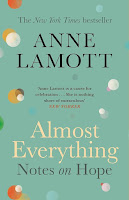 |
| (Amazon UK link) |
The subtitle of this book is ‘Notes on Hope’ and the introduction - or ‘prelude’ chapter - talks about modern life, with its wars, shootings, famine, political battles and more, causing depression and hopelessness. She also mentions taking note of the happy voices of children playing, of flowers blooming, of other indications that God - or the light - is still there. She says, too, that despite all the horrors in the world and in many people’s backgrounds there are moments of joy, times for celebration, reasons to be thankful.
It might sound a bit preachy, but that’s not the case at all. Anne Lamott writes informally, pointing out her own flaws and temptations and in a random selection of broad topics, she introduces reasons to hope. She acknowledges that perhaps most people feel more reasons for despair than hope, but that every step forwards counts; that each act of love or kindness brings God into other people’s lives.
The chapters are short, each one complete in itself; one of them is just one page long. They’re quick to read, and on the whole I thought them encouraging, even if I really couldn’t relate to the one about the author’s childhood, expected to be a particular kind of person, and encouraged in perfectionism. But in other chapters, I found myself nodding my head, even if the style of writing is a bit abrupt. Anne Lamott was around my age when she wrote this book, but evidently a great deal more active even though she mentions aches and discomforts of being not as young as she once was.
The most important message that shines through this book is one I have heard many times from other writers, but it’s always worth hearing: we are good enough as we are. We are made in God’s image, and we can’t do anything to make him love us any more. That’s not to say we shouldn’t be kind, or generous. But we should do it because we know it’s right, and because it helps other people and spreads God’s love.
However we don’t need to have perfect bodies, or give up food we like eating, or attempt to fit in clothes we wore as teenagers. We need to accept ourselves as beloved children of the Father. Again, the author manages to feel very balanced in her casual advice: forget about spending an hour at the gym every day being coerced, but maybe go for a half hour walk. Eat and drink for enjoyment, but don’t over-indulge. Sit down at a table with people we love, as if serving every meal to an important guest, rather than grabbing junk food in the kitchen.
I don’t know that anything in the book was new to me, and I have already forgotten quite a bit of what I read, but I thought it had some thought-provoking reminders about living in the moment, gratefulness and acceptance. I had to wade a bit through the mentions of hatred and childhood pressure, which weren’t really relevant, but there’s good stuff there, and I’m glad I read it.
Recommended if you want something that’s written from a loosely Christian perspective on the topic of hope, but without any proselytism or preaching. On the other hand, if you’re bothered by even minor bad language or hints of immorality, or if you’re a fundamentalist of any kind (including atheism) then you might find this book disturbing or worse. Anne Lamott considers that fundamentalists cause most of the world’s problems.
Review copyright 2022 Sue's Book Reviews
No comments:
Post a Comment